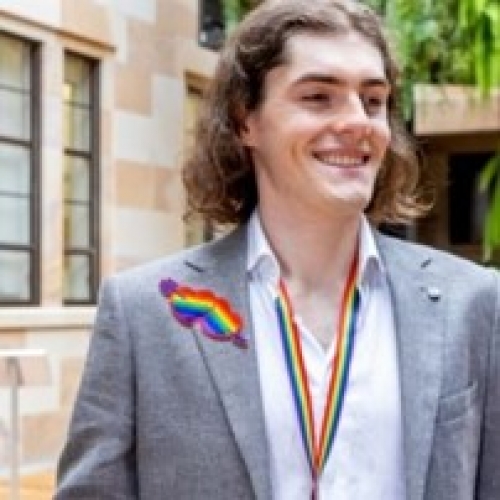
Liam Timms
The University of Melbourne
Liam Timms is a PhD student at the University of Melbourne, working on distributed optimisation with applications to making road planning more environmentally friendly. They received a Bachelor of Mathematics (Honours) form the University of Queensland, working on using mathematics to prevent elephant poaching. Since 2022, Liam has been active in improving equity, inclusivity, and diversity in mathematics by educating staff and students on harassment and discrimination. In their spare time, Liam enjoys reading, long-distance running, and kung fu.
1. Give me a quick overview of the type of mathematics you are studying, and/or the aims of your research and its potential applications/outcomes (how you would explain your work and studies to friends who don’t study maths?)
Optimisation is a crucial area of applied mathematics, particularly for industry applications concerned with reducing operational time, and resources. Distributed optimisation is an increasingly relevant area of optimisation with the prevalence of distributed computing systems such as volunteer computing projects (e.g. climateprediction.net) and drone light shows. These systems require individual computers, called “agents”, to execute an algorithm and communicate their progress and results to other agents in the network. When the network becomes large (volunteer scientific computing) or requires precise coordination (drone swarms), communicating with the entire network can become impractically slow. I am developing algorithms to solve these kinds of problems without needing to communicate with the whole network.
2. How did you get into the mathematical sciences? Was there someone or something that inspired you to this field?
I’ve always loved mathematics. It was my favourite class in school, all the way back to Grade 4. There was no doubt in my mind that I wanted a maths degree, and that drove me through high school and then university. My earliest inspiration was my Grade 5 teacher, Mr Smith. He saw how much I loved the subject and he pushed me to excel. He even asked me to help out other students who were struggling, which really cemented my understanding. My inspirations have always been the passionate and diverse maths teachers and lecturers who demonstrated that someone like me (neurodivergent, nonbinary) can succeed in mathematics.
3. Winter School is designed to give students a deeper understanding of their area of research and expose them to others working in different fields/industries. Tell me about your Winter School experience. What was the most valuable part of the program for you?
The most valuable part of the Winter School was meeting people in a similar career stage (PhD, early career researcher) who are looking at similar problems to me but from a completely different angle. The School has given me so many fresh ideas for research directions, and seeing all the participant talks was inspirational.
4. What was your main take away/s from AMSI Winter School? Something you learnt? A connection you made? Do you have new ideas for your work/research or see it in a newlight?
My main takeaway was from the Diversity panel, where some of the most impressive mathematicians I’ve met all shared the hardships they endured while trying to succeed in mathematics. It gave me a lot of inspiration in their endurance, and also in the systematic flaws in the academic pipeline that can prevent diverse people from becoming mathematicians. Hearing those diverse stories opened my eyes to issues I was previously not aware of.
5. You received a grant to attend AMSI Winter School. How important was this in terms of your ability to attend, fully participate in the program and meet others studying in similar fields?
I was invited to speak in the second week of the Winter School, but that funding only allowed me to be in Brisbane for a single week. This travel grant was instrumental in both attending the first week of the Winter School and, subsequently, properly meeting some incredible people attending the School.
6. What advice would you give to someone who is considering applying for Winter School? How would you describe the conference to them?
Be open to new experiences and perspectives. You can get new insights and inspirations into your own work from anywhere, even lectures that don’t immediately seem relevant. The different areas of maths are so interconnected, so experiencing different types of maths is essential for broadening your perspective.
7. Where do you want the mathematical sciences to take you? Where do you see yourself in five, ten years time?
Once I finish my PhD, I plan to work for a not-profit or governmental department. I want to keep learning maths, so I plan to teach myself and stay up to date with new research while working in industry. My dream is to do logistics for a humanitarian organisation like UNHCR or Doctors Without Borders. I want to take my knowledge and use it to help either people or the environment (ideally both). Mathematics and computer skills are in very high demand, and I intend to use them to help tackle the biggest problems we face.
8. Any other feedback/comments you would like to provide on the travel grant or AMSI Winter School
None, it was a very straightforward experience.

